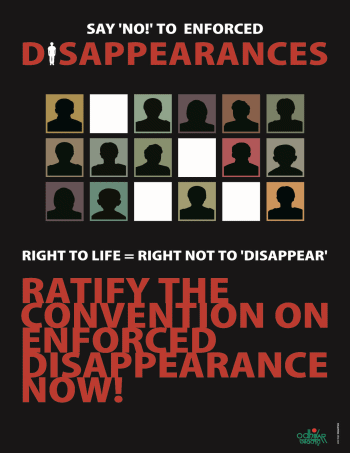29/08/2016 PRESS RELEASE International Justice
On this International Day of the Victims of Enforced Disappearances, FIDH and its member organisations call for an end to involuntary and enforced disappearances around the world, and for justice for victims and their families. The newly-elected International Board of FIDH called at its first session (which took place right after the end of the 39th FIDH Congress held in South Africa on August 25-27) for increased international attention to the ongoing horrifying practice of enforced disappearance. Despite the fact that enforced disappearances are a crime under international law, thousands of cases around the world persist in total impunity. In addition; hundreds of people, notably human rights defenders, and political dissidents continue to be disappeared every year by both non-state actors and state security forces.
Enforced disappearance is an especially traumatizing crime, leaving behind a trail of victims that extends far beyond those who have been disappeared. The families and loved ones of the disappeared also suffer greatly, unable to obtain justice due to the denial of the crime, and unable to fully mourn or seek closure due to the uncertainty of the whereabouts of their loved ones. This makes enforced disappearance a particularly cruel crime, leaving its victims and their loved ones in limbo and outside the protective ambit of the law.
Women whose husbands have been disappeared face especially difficult emotional, social, and legal challenges, as they are neither recognized as ’widows’ nor ’legally divorced’. This most often prevents the spouses of the disappeared from accessing the assets of their significant other, leaving them even more financially vulnerable. In cases where women would like to rebuild their lives after a spouse’s prolonged disappearance, they are often denied the right to remarry as they still considered to be legally married to their disappeared spouse with no means of acquiring a divorce or death certificate.
Adding to the trauma of the disappearance of a loved one, families of victims of enforced disappearance often feel they cannot speak out about this type of crime, either because they have been directly threatened by the authorities or non-state actors, or because they hope that by keeping silent their loved one might be returned alive. Victims’ families and human rights defenders who do speak out about enforced disappearances have faced intimidation and further violence, deepening the shroud of secrecy and impunity that surrounds this type of crime.
Families of victims of enforced disappearances that have tried to seek justice through national courts have faced neglect and even deliberate stonewalling by judges and State attorneys. The refusal of the authorities to prosecute these crimes has created a culture of impunity that has made enforced disappearances even more prevalent, with growing numbers of state and non-state actors acting above the law and thus committing disappearances, often in broad daylight and in front of witnesses. Even in cases where clear evidence has emerged inculpating State security forces, perpetrators are almost never prosecuted. The Rome Statute of the International Criminal Court (ICC) defines ’enforced disappearance’ as a crime against humanity under Article 7, and obliges its State parties to ensure truth, justice, and protection for the victims of enforced disappearances and their families.
Therefore, on this International Day of the Victims of Enforced Disappearance, FIDH commemorates all those who have been unlawfully taken away, torn apart from their loved ones, and subjected to torture and other forms of inhuman treatment in captivity. In remembering these individuals, FIDH reiterates its call to the governments around the world, notably in Bangladesh, Belarus, Burundi, Egypt, Guatemala, Laos, Philippines, Syria, and Zimbabwe, among many others, to ratify the International Convention for the Protection of All Persons from Enforced Disappearance (ICPPED), and to put an immediate end to enforced disappearances and the refusal by the authorities to seek truth, justice, and reparation for these crimes. FIDH further demands a return of victims of enforced disappearances to their families, a thorough and impartial investigation into these crimes, and upholding the right to freedom of speech and assembly of organisations and individuals to speak out in the search of truth and justice.
Report Published on August 29, 2016 at www.fidh.org




